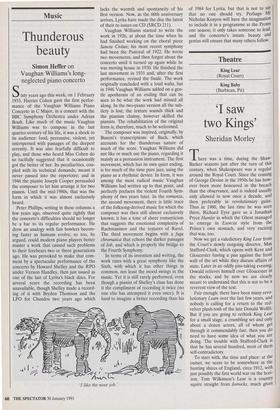Theatre
King Lear (Royal Court) King Baby (Barbican, Pit)
`I saw two Kings'
Sheridan Morley
There was a time, during the Shaw- Barker seasons just after the turn of this century, when Shakespeare was a regular around the Royal Court. Since the coming of George Devine in the 1950s he has how- ever been more honoured in the breach than the observance, and is indeed usually only allowed in now once a decade, and then preferably in revolutionary guise. Thus in 1980, the last time he was seen there, Richard Eyre gave us a Jonathan Pryce Hamlet in which the Ghost managed to emerge in Exorcist style from the Prince's own stomach, and very exciting that was, too.
Now we get a valedictory King Lear from the Court's slowly outgoing director, Max Stafford-Clark, which opens with Kent and Gloucester having a piss against the front wall of the set while they discuss affairs of state. Later in an oddly piss-taking evening, Oswald relieves himself over Gloucester in the stocks, and by now we are clearly meant to understand that this is not to be a reverent view of the text.
Fair enough: there have been many revo- lutionary Lears over the last few years, and nobody is calling for a return to the red- velvet plush-tosh of the late Donald Wolfit. But if you are going to rethink King Lear for a small stage, a crumbling set and only about a dozen actors, all of whom get through it commendably fast, then you do need to have some idea of what you are doing. The trouble with Stafford-Clark is that he has several hundred, most of them self-contradictory.
To start with, the time and place: at the outset, we seem to be somewhere in the hunting shires of England, circa 1912, with just possibly the first world war on the hori- zon. Tom Wilkinson's Lear is a country squire straight from Jorrocks, much given
to boozing and sexually abusing his house- hold staff, including the first-ever Fool I have seen played as a man in drag. But by the end of the evening we have mysterious- ly been transported to latter-day Bosnia, where refugees huddle behind barbed-wire fences and light candles to the memory of the disappeared; or could that be South America?
Wherever it is and we are, the play has been lost for some time by then, Stafford- Clark's determination to rethink it leads to some cerebrally intelligent notions but a fatal lack of heart or soul, so that neither Lear's reunion with his Cordelia nor her subsequent death is of any more than pass- ing interest. We are never moved, except occasionally to wonder what it is that the director really wants us to know of his view of the play. He keeps the Fool around for much longer than usual, turning him into a Brechtian chorus who eventually gets strung up for writing rude words on a wall: but why?
The problem with all of this random invention is that it highlights the fragmen- tary, inconclusive, unsatisfactory nature of much of the play without ever giving us anything to latch on to. If King Lear is a map of the world in chaos, we still need a route through it which makes some sort of coherent sense somewhere along the line. Tom Wilkinson in the title role is bluff, tough, but in moments of crisis reminiscent more of Evelyn Waugh after a bad lunch than a ruler who has broken first his king- dom, then his family and finally himself.
Adrian Dunbar as a Belfast Bastard for whom God has resolutely refused to stand up is always intriguing, as is Andy Serkis's transvestite Fool and Lia Williams's country-house-party Goneril. But none of them seem to be inhabiting the same uni- verse, let alone the same play.
In the Barbican Pit, James Robson's King Baby is a desperately overlong but intermit- tently intriguing account of life in a rehabil- itation clinic for alcoholics. In order to inject some sort of drama into what other- wise would simply be an inert succession of alkie monologues (My name is Jimmy and I'm an alcoholic and I'm now going to bore you rigid for 20 minutes'), Robson postu- lates a power struggle between the counsel- lor (Lalor Roddy) and his worst pupil, a bombastic garage-owner (Tom Georgeson, the King Baby of the title) who is deter- mined not to give in to permanent sobriety without a fight.
The conclusion is a chilly one: that there is no real cure for alcoholism, merely the possibility of a daily struggle against it.
Simon Usher directs a talented east, but the evening could lose easily 40 minutes: Barbican leaders seem to think that having once got us into that vast concrete multi- storey carpark, we always wish to remain there for at least three hours. I am pre- pared to offer a stopwatch to the first pro- duction which has the sense and charity to get us out in less than two and a half.











































































 Previous page
Previous page